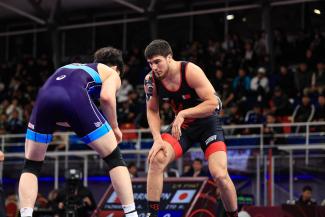North Macedonia hosts Referee and Coaches course, implements women's program
Thursday, May 12, 2022 - 10:56 By United World Wrestling Press

SKOPJE, North Macedonia (May 9) -- United World Wrestling hosted the Referees and Coaches Course in North Macedonia from May 2 to 9, 2022. The course was conducted under UWW's Development department and educators Davor PETANJEK (CRO) and Georgi SREDIKOV (BUL) in Kochani, a city east of the capital Skopje.
North Macedonia will now implement a dedicated program for women's wrestling which is a significant part of UWW's 2022-2026 strategy. The program will contribute to the next stage of national training camps dedicated to women's wrestling in Macedonia.
A competition was also held for U17 wrestlers after the course to assess the referees and coaches and the educators noticed significant improvement.
 The Referee and Coaches course was held from May 2 to 9.
The Referee and Coaches course was held from May 2 to 9.
"This course was a big project for us," Dragana Saveva, secretary of the North Macedonia Wrestling Federation, said. "We had a chance to learn from the best, I can't describe the changes that they made with our coaches and referees in a positive way. They learned something new, and improved their knowledge and skills."
The course was used to demonstrate the latest rules and systems to the referees while coaches were shown positive ways to motivate wrestlers, better communication and understand wrestling easily.
"I would like to thank the educators, UWW and Olympic Solidarity for helping us to improve in many ways with this project," Savena said.
The national federation submitted an official proposal for increasing the participation of girls in wrestling along with the active promotion of women's wrestling in the country. The other focus of the federation will be to improve the training conditions for women wrestlers for the 2022 season.
The wrestling federation, under the guidance of UWW, will also educate female wrestlers with information on available scholarships, benefits, tournaments and camps. UWW will develop the wrestlers' skills and focus on positive health, team spirit and self-confidence.
 UWW educators Davor PETANJEK (CRO), left, and Georgi SREDIKOV (BUL).
UWW educators Davor PETANJEK (CRO), left, and Georgi SREDIKOV (BUL).
The program will target 22 local clubs and a few schools to encourage more girls to participate in wrestling. The federation will organize five camps for the clubs in five different cities namely Prilep, Kochani, Shtip, Skopje and Radovish. Singlets for the wrestlers, sports equipment, and other sports kits will be funded by the federation.
The aim of the federation is to have a team of experienced trainers for women's wrestling and a team of 100 wrestlers for national-level competition and ultimately have success at the European and Balkan Championships.
Off the mat, the national federation is keen on framing successful and supportive policies and legal frameworks for the promotion of gender equality and women’s rights.
Macedonia is one of the fastest-growing nations in women's wrestling since last year as the sports took roots around a decade back. In 2022, women's wrestling demonstrated its seventh consecutive year of growth nationally with over 100 participants from eight local wrestling clubs. The country already hosted 15 wrestling camps, and national and local championships in all age groups and has won medals in women's wrestling at the European and Balkan Championships.

The increased participation of girls in wrestling can positively impact on attendance, engagement, opportunities for girls and camps. The sport will also provide opportunities for girls and help the wrestlers establish in the local community, ensure that girls can wrestle girls, reduce the risk of injury and increase support for various clubs and have more active student-athletes.
Increasing the number of girls in wrestling will allow girls to wrestle girls instead of being forced to compete against boys. This is important in terms of the ideals of fair play as well as from a safety perspective. This also builds the idea that wrestling can be supported by the country and attract more sponsors.


Share your thoughts.
Comments